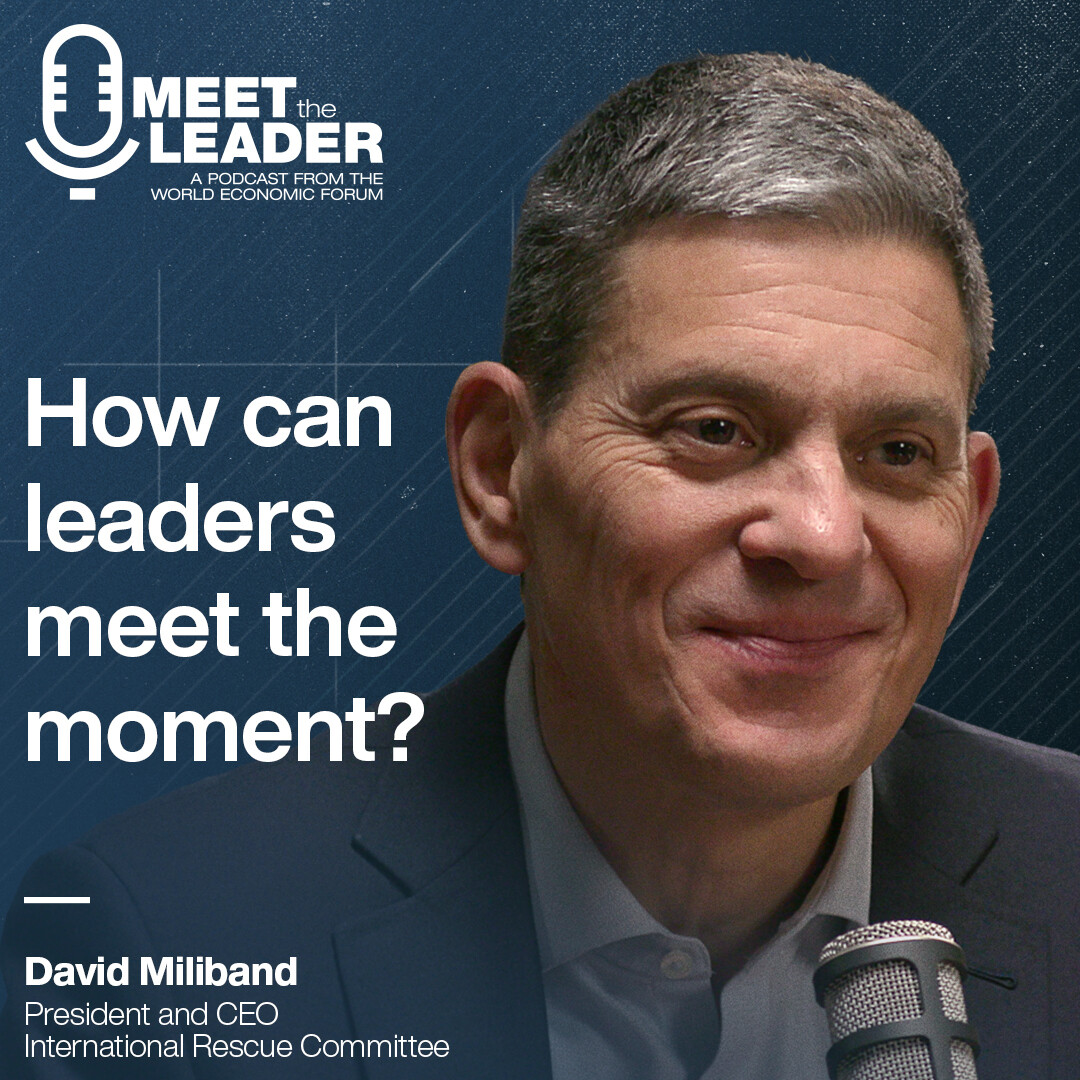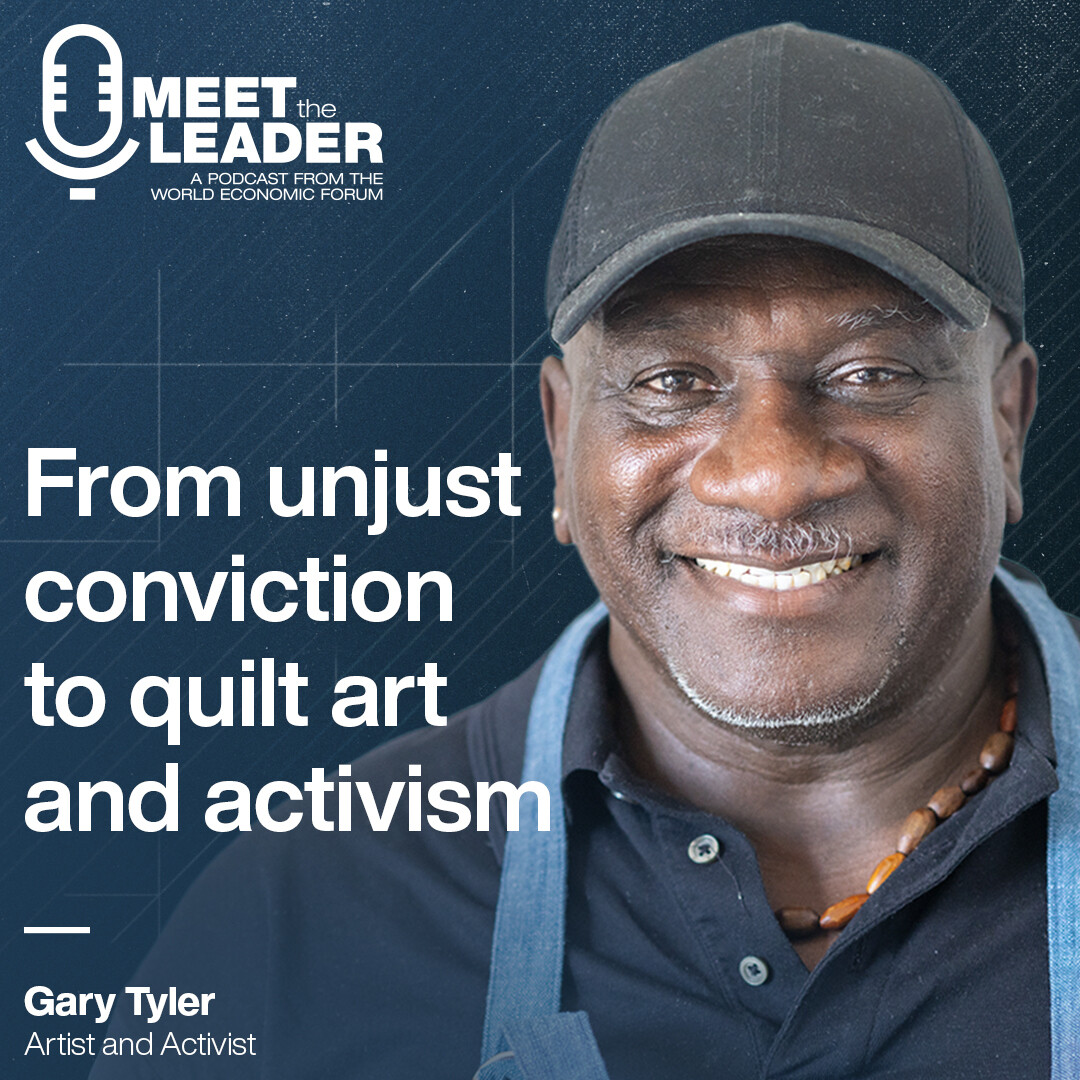NYSE Group's Lynn Martin: Navigate uncertainty with this simple habit
播客文字稿
This transcript, generated from speech recognition technology, has been edited for web readers, condensed for clarity, and may differ slightly from the audio.
Linda Lacina, World Economic Forum: Welcome to Meet The Leader, a podcast where top leaders share how they're tackling the world's toughest challenges. Today's leader: Lynn Martin, the president of NYSE Group, the New York Stock Exchange. She'll talk about navigating uncertainty and the importance of over-communication.
Subscribe to Meet the Leader on Apple, Spotify, and wherever you get your favourite podcasts and please take a moment to rate and review us. I'm Linda Lacina from the World Economic Forum and this is Meet the Leader.
Lynn Martin, NYSE Group: People want to hear from leadership, but leadership needs to hear from those folks in the trenches. They're the ones that are doing the day-to-day.
Linda Lacina: Lynn Martin is the president of the NYSE Group and runs the New York Stock Exchange. When I met her at the Annual Meeting in Davos this January, she had just finished her first year on the job. As you know, 2022 was a turbulent one for stocks and with more uncertainty ahead, she shared with me what she depended on most to stay focused, steer her team and to drive home the messages that were most important.
I should note Lynn doesn't just run the exchanges. As the head of the NYSE Group, she also serves as the chair of the ICE Fixed Income and Data Services business. Her role requires not just an understanding of the markets, but the tech and the daily flow of data that underpins it.
She talked to me about how she puts her background in computer programming and her master's in statistics to work.
And as only the second ever woman in her role, she shared her thoughts about how to get more women in finance and tech.
She'll talk about all of that, but first she'll get us started with the year ahead and how leaders can consider the big challenges already on their way.
Lynn Martin: There's no question that the tensions around the globe have impacted various of our companies, particularly those companies that either have supply chains that are not based in the US or that operate outside the US, but then also inflation as an area, wage inflation in particular, is an area that is on the focus of many CEOs minds.
Meet The Leader / Linda Lacina: What should leaders be thinking about as they navigate this year and they think about inflation?
Lynn Martin: You know, I am a data person. Look at the data in front of you. Try to drown out the noise. There are a variety of stories out there, but look at the core data in front of you. Look at the data and how it's affecting your business. If your business is doing well, then feel good about that. And just be methodical.
More and more of the leaders that I talk to are reminded of the fact that this isn't 2008. If you look at things like bank balance sheets, the banks have never had stronger balance sheets. So, this is not the crises that we've had that have really impacted solvency or whatever the case may be of major systemic corporations.
Linda Lacina: A theme really of the past few years, especially at the World Economic Forum, has been resilience. How do we build it? How do we build it in the economies and humanitarian organizations, from the climate, etcetera, etcetera. To you, what is the definition of resilient leadership?
Lynn Martin: You know, anyone who has led a company over the last three years I think has earned their resiliency badge. You think about in 2020, we went into a global pandemic when we were here in 2020, I don't know that any of us knew what COVID was going to be. They've led through social challenges as well. They've led through global geopolitical issues. They led through macro-economic uncertainty. They've led through a shift in supply chain focus. They've led through a shift of how we work. The concept of working from home was foreign to many organizations as we convened in 2020. But now you talk about what your workforce is, how frequently they're in the office, how they make use of technology. So, I would say any leader that has led over these past three years has really earned their resiliency merit badge.
Any leader that has led over these past three years has really earned their resiliency merit badge.
”Linda Lacina: What in your own experience was a moment where you had a chance to demonstrate that resilience? What happened and how did you navigate it?
Lynn Martin: Well, I would say probably over the last year with the slowdown of the IPO markets, I mean, I've got two businesses really at NYSE. One is focused on transactions and transactions business has done quite well given all of the volatility in the market. But the IPO business, the listings group underneath my leadership, has been an area where, you know, it has taken a little bit to reset. They've been more focused on having conversations, staying close to those customers who said, yes, I value the currency of the public markets, I'm just not going to go in this uncertain environment.
Linda Lacina: And in that, is there a trait that you valued or have leveraged? In some cases, I talk to people and they say, well, you know what? I'm very patient. So I'm able to listen to sort of see what each situation has or, hey, you know
what? I'm not afraid to act, you know, and then change course. Is there a trait or a habit that has helped you?
Lynn Martin: You know, early on in my career, one of my first mentors, one of my first bosses, taught me a very important phrase: you can never overcommunicate. It was one of the first lessons I learned out of college when I was in coding, actually, ironically, and I think the epitome of that was really 2022. You can never overcommunicate with your staff because strategic priorities change. You can never overcommunicate with your customers, which is why I'm so proud of all that we accomplish and all the amazing conversations that we had at NYSE, in fact, at NYSE we had more than 20 world leaders visit us last year. We had a record number of events, a record number of investor days, because people want to be with people. I mean, look at the attendance you have at Davos this year, it’s probably record numbers because people want to convene. They want to - human nature is they want to have conversations in person.
At the end of the day, people want to hear from leadership, but leadership needs to hear from those folks in the trenches. They're the ones that are doing the day to day. They're the ones that are having the detailed conversations with the lower-level customers. They're the one that's really getting the sense of the way people are feeling. So, it needs to be two-way communication more than anything.
Linda Lacina: We talked a little bit about the role of leaders and when it comes to public leadership, what do you think is needed now most, especially in this time of what I guess our Global Risk report calls a polycrisis? What's needed most from public leadership right now?
Lynn Martin: I think the public leaders need to try to work together, try to see each other's viewpoints more so than ever. People can't just go run in their corners and fight their corner. They need to come to the middle. They need to understand the opposing side’s viewpoint and try to find a path forward.
Linda Lacina: When we look at maybe what is excellence in public leadership, what is the hallmark or hallmarks of that? Like when you look at something, you think, oh, gosh, that's the gold standard. What are those traits or those characteristics?
Lynn Martin: You know, it's someone who can listen to the other side and not just immediately say, 'no, I don't agree with you.' Someone who's not antagonistic. Someone who's not defensive. Someone who is more: okay, I understand what you're saying. I may disagree. It's fine to disagree and have a spirited debate, but ultimately respecting each other's viewpoints and treating the other side with respect I think is the most important thing.
Linda Lacina: You talked a little bit about your coding background because of a degree in computer science, right? Tell me a little bit about that, because not everybody I mean, there's more and more people exploring tech, but that wasn't always so common. What's that been like?
Lynn Martin: I was the only female in my comp sci undergrad. And if I look at my master's degree, which is in math, I think there was maybe two other women in the degree with me and mainly they went into the educational field. A lot of them pursued PhDs to become professors, things of that nature. So, it wasn't a field that was filled with an awful lot of women when I joined it.
Linda Lacina: How does that help you, that experience
of forging a path that's a little bit different? How does that help you in situations where, you know, maybe patterns are not clear?
Lynn Martin: You know what it does? It pushes me to identify talent within the organization from non-typical places. It forces me to spend a lot of time with the more junior talent to get to know my team members really well. And one of my favourite things to do is to identify diverse talent and put them in a stretch role. More and more I'm seeing women who are offered jobs but then say no, I can't do it, or no, I'm too nervous. And the fact is someone's offering you a opportunity because they think you can do the job. You don't have to necessarily be 100%, but someone else thinks you are the right candidate. So, I spend a lot of time with women who are in that situation.
Linda Lacina: So in that respect, would you advise those people to sort of try to catch up with other people's confidence in them?
Lynn Martin: Absolutely. I was the benefactor of multiple people who believed in me, who took a chance on me. But I always tell my former bosses that and they say, I didn’t take a chance on you. I just knew you were the right person for the job. So, when I thank them for giving me an opportunity, I get that sort of response. But conversely, now that I've put various people in various opportunities, I hear the same thing back, which is the most gratifying thing in the world.
Linda Lacina: What is maybe a surprising thing that people don't think about enough when it comes to sort of closing this gap of women working in the financial sector? What are we overlooking about either getting them in or retaining them?
Lynn Martin: Yeah. I mean, retaining them is probably the biggest challenge, especially when women go through various life events, either getting married or having children or whatever the case may be. In my mind, one of the things that we are still getting our heads around is when a woman has decided to spend a year or two at home with a child. How do we get them back in the workforce? Because frequently they want to come back. They just don't know how to onboard. And I applaud many of those organizations who have developed returnship programs, things of that nature, and do welcome high performers back with open arms.
Linda Lacina: To touch back on the your technology background, people might not realise how much technology drives the stock market. Why is it so important and so useful for you to have this background and be able to speak this language?
Lynn Martin: Yeah. The interesting thing this year, with all the volatility in the markets, as we talked about earlier, we're processing half a trillion incoming order messages a day. Incoming buys, incoming sells. Someone with a technology background is going to worry about the side effects of that; performance, capacity, resiliency, all of those sorts of things. So markets are electronic. Now, importantly, our markets at NYSE have a very important human element, and the human is there to smooth out the volatility that all that messaging creates. They're there to put the human judgement over the good technology. But make no mistake, you need to have excellent technology to handle the demands of markets today in a very interconnected world, where things that happen in other countries move our markets, things that happen in other asset classes within the US, move our equities markets. So, it's such an interconnected market that to consider that technology would not be the key component, the key driver, of our markets would be a fallacy.
Linda Lacina: How would your year have been different if you didn't have that background?
Lynn Martin: I think I probably would have spent a lot more time with my technology team getting up to speed on - what was the matching engine look like,take me through how we got from here to there- as opposed to having the next layer of conversations with my tech team from an architecture standpoint saying, 'why do we ingest this market data here? Because that doesn't make sense, why don't we just ingest it there?' So, it's just a different level of conversation that I'm able to have with our technology team. I think that's going to have the next generation of positive effects on performance that we provide to our customers.
Linda Lacina: If you were going to give any advice to you for last January, say: 'Yeah, hey, you know, a bunch of stuff is going to happen.'
Lynn Martin: A bunch of stuff is going to happen. That's the right way to describe 2022.
Linda Lacina: What would you tell her?
Lynn Martin: I would tell myself, go back to the golden rule of over communicating, because more than ever, our listed companies, our members, our traders want to have a conversation about what we're hearing from different parts of the market. At the end of the day, if we stick true to our six pillars, those being community, capital, innovation, sustainability, opportunity and transparency, we will find our way through and we'll shine.
If we stick true to our six pillars, those being community, capital, innovation, sustainability, opportunity and transparency, we will find our way through and we'll shine.
”Linda Lacina: So it's about sort of reminding yourself before you take an action, what are my values again? There's my roadmap.
Lynn Martin: Absolutely. I'm so proud of the way we and me and my team have operated over this past year of unprecedented challenges.
Linda Lacina: Is there a piece of advice either, you know, over the last year or even throughout your whole career that you've just been grateful for?
You're not scalable. You cover so much more ground if you have the right team under you.
”Lynn Martin: I mentioned the communication one. Another wise piece of advice I received is you're not scalable. It took me a minute to figure out what that meant. It means you need to have the right team under you, because you cover so much more ground if you have the right team under you. And from my perspective, that team has to collaborate. That team can’t operate in silos. So that's been another area that I've been keenly focussed on.
Linda Lacina: And how do you sort of create the environment that leads to that sort of collaboration?
Lynn Martin: You know, a lot of spirited debates. A lot of it's okay to disagree, but we leave our disagreements in the meeting room and, you know, giving people the bandwidth to think differently, think outside the box, and then try ideas.
Linda Lacina: Is there a book that you recommend?
Lynn Martin: Oh, gosh, you know, I've been given so many books over the last year. You know, Julia Boorstin, whose new book about When Women Lead, that's a fantastic read. Mainly it really spoke to me because of the female component, but also is data heavy, which I personally love given my background.
I also read a book by the COO of VMware called Never Enough, which is just about leadership. He's a former Navy SEAL and I really loved that book as well.
Linda Lacina: What would somebody take from that? How would they change after they read the book?
Lynn Martin: You know, there's a lot of really practical advice in terms of how do you lead teams through challenging situations. And I don't care what position you're in. You're always going to face a challenging situation throughout your career. So, it was more how do you stay calm, lead teams through it, and what does the leader wind up learning? So I thought that was great. In Julia's book, though, the amount of female entrepreneurs out there is something that I would say I'm pleasantly surprised, in so many different industries, particularly health care. You know, some of the consumer industries. Considering females have so much purchasing power, it's amazing to see women coming up with ideas that really are starting to move the needle.
Linda Lacina: A leader earlier today was talking about how women can navigate spaces where maybe they're the only woman in the room. We've got this exhibit upstairs, in fact. And in some cases, there was one woman who had the advice of, you know, that made sure that she was always visible in any conference room. There's a certain place that she would sit, depending on the orientation, so that she wouldn't get lost and that she would be able to easily interact with whoever may be the decision maker and things like that.
In your career, are there maybe little tips or things that you've you've kind of rules of the road that have helped you?
Lynn Martin: Yeah. You have to figure out the way you can make your point. And it's not always shouting in a meeting room over. Someone else can be a follow up email to the person who is running the meeting. It could be a five minute follow up meeting with that person. There is a way to interject your point, but do it gracefully. Don't try to speak over everyone.
Linda Lacina: At Davos here, one of the things that we do is sort of discuss things that can drive the agenda for the entire year. What do you want leaders to be thinking about the most?
Lynn Martin: I think I want leaders to be — I think we're all going to be focused on — the continued sustainability challenges, the climate challenges. I think that's going to be a big area of focus for everyone. Obviously, I think the state of everyone's economy, respective economies, are going to be a big area of focus as well.
Linda Lacina: How can leaders take the spirit of Davos, of
collaboration, of partnership? How can they port that into their teams and make it something that is alive and well the entire year?
Lynn Martin: Yeah, it's something that I think is a really important point. When you go to meetings like this, you need to have a readout with at least your executive team right afterwards. Say here's the key takeaways that I took. Here's what other business leaders are thinking about. So, I think that's really important. And I think, you know, if you boil it down to a couple of key themes, it helps orient your teams versus a data overload type situation.
Linda Lacina: That was Lynn Martin. Thanks to Lynn and thanks so much to you for listening. A transcript of this episode and my colleagues’ episodes Radio Davos and the Book Club Podcast is available at wef.ch/podcasts.
If you like that episode, check out episode 51 from August 2022 with Andrea Fuder. She's the Chief Purchasing Officer at Volvo Group. It's one of my favourites, if I can say such a thing, and you'll learn how this unique role helps her be, as she says, a spider in the web and how purchasing gives her a unique understanding of needs across the organization and how that informs how she leads and how she drives change. She also shares why she loves the children's book Pippi Longstocking and what it can teach us about leadership.
This episode of Meet The Leader was presented and produced by me with Juan Toran as studio engineer, Jere Johansson as editor and Gareth Nolan driving studio production. That's it for now. I'm Linda Lacina with the World Economic Forum. Have a great day.
The second woman in history to run the New York Stock Exchange shares her 'non-linear' path to President and the integral role her background in programming, technology and statistics plays in running a modern stock exchange. In a conversation recorded at the 2023 Annual Meeting in Davos, she talks about her first year on the job, the simple habit that helped her navigate 2022's rollercoaster year for stocks, the books inspiring her now, and what's needed to get more women into finance and tech.
Subscribe on any platform: https://pod.link/1534915560.
Join the World Economic Forum Podcast Club.
分享:
更多集:
每周 议程
每周为您呈现推动全球议程的紧要问题(英文)




